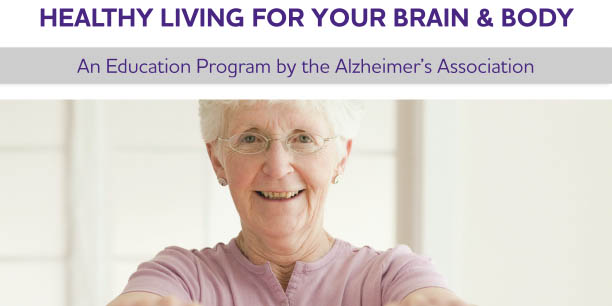
It makes sense as we age that we want to keep our brains active, but did you know that it’s just as important to keep your body physically fit?
The latest research on Alzheimer’s disease is providing insights that show the role that diet, nutrition, exercise, cognitive activity and social engagement play in maintaining our cognitive health. The Alzheimer’s Association will share these research findings in a free webinar, Healthy Living for Your Brain and Body: Tips from the Latest Research, scheduled for 11 a.m. to noon Friday, Feb. 12.
Healthy Living for Your Brain and Body is one in a series of live webinars that will be offered at no charge during the month of February. The full schedule for the month includes:
- Effective Communication Strategies (This workshop teaches caregivers to decode verbal and behavioral communication from someone with Alzheimer’s and other dementias. Develop strategies for having meaningful connection with people in differing stages of dementia.) – 2 to 3 p.m. Wednesday, Feb. 3; and 2 to 3 p.m. Tuesday, Feb. 16.
- COVID-19 and Caregiving (Caring for someone living with dementia during the COVID-19 pandemic adds unique challenges for caregivers. This program provides simple tips caregivers can put in place whether the person living with dementia lives at home, in a residential facility, or care providers are coming into the home.) – 4 to 5 p.m. Tuesday, Feb. 9.
- Understanding and Responding to Dementia-related Behavior (Behavior is a powerful form of communication and one of the primary ways that people with dementia communicate their needs and feelings as the ability to use language declines. But these behaviors can be challenging for caregivers. Join us to learn how to decode behavioral messages and learn strategies to intervene with some of the most common behavioral challenges.) – 2 to 3 p.m. Wednesday, Feb. 10; and 2 to 3 p.m. Tuesday, Feb. 23.
- Healthy Living for Your Brain and Body: Tips from the Latest Research (We’ve always known that the health of the brain and body are linked, but now science is able to provide insights into how we can optimize our physical and cognitive health as we age. Learn about research in the areas of diet and nutrition, exercise, cognitive activity and social engagement, and use hands-on tools to help you incorporate these recommendations into a plan for healthy aging.) – 11 a.m. to noon Friday, Feb. 12.
- The 10 Warning Signs of Alzheimer’s Disease (Learn about the 10 common warning signs, what to watch for in yourself and others, typical age-related changes, the benefits of a diagnosis, early detection and more.) – 7 to 8 p.m. Wednesday, Feb. 17.
- Conozca las 10 Senales de Alzheimer’s (En Espanol) 11 a.m. to noon Friday, Feb. 16.
- Understanding Alzheimer’s and Dementia (Learn about the impact of Alzheimer’s, the differences between Alzheimer’s and other forms of dementia, risk factors, current research, treatments to address some symptoms and more.) – 5:30 to 6:30 p.m. Monday, Feb. 22.
- Living with Alzheimer’s: for Caregivers – Middle Stage – Part 1 (In the middle stage of Alzheimer’s disease, those who were care partners now become hands-on caregivers. Join us for this 3-part series and hear caregivers and professionals discuss helpful strategies to provide safe, effective and comfortable care in the middle stage of Alzheimer’s.) – 1 to 2:30 p.m. Monday, Feb. 1.
- Living with Alzheimer’s: for Caregivers – Middle Stage – Part 2 (In the middle stage of Alzheimer’s disease, those who were care partners now become hands-on caregivers. Join us for this 3-part series and hear caregivers and professionals discuss helpful strategies to provide safe, effective and comfortable care in the middle stage of Alzheimer’s.) – 1 to 2:30 p.m. Monday, Feb. 8.
- Living with Alzheimer’s: for Caregivers – Middle Stage – Part 3 (In the middle stage of Alzheimer’s disease, those who were care partners now become hands-on caregivers. Join us for this 3-part series and hear caregivers and professionals discuss helpful strategies to provide safe, effective and comfortable care in the middle stage of Alzheimer’s.) – 1 to 2:30 p.m. Monday, Feb. 22.
Like all programs and services of the Alzheimer’s Association, the webinars are offered at no charge, but registration is required. To register, click
here or call the free Alzheimer’s Association Helpline at 800-272-3900.
Alzheimer's Association
The Alzheimer's Association leads the way to end Alzheimer's and all other dementia — by accelerating global research, driving risk reduction and early detection, and maximizing quality care and support. Our vision is a world without Alzheimer's and all other dementia.™ For more information, visit www.alz.org or call the 24/7 Helpline at 800.272.3900.